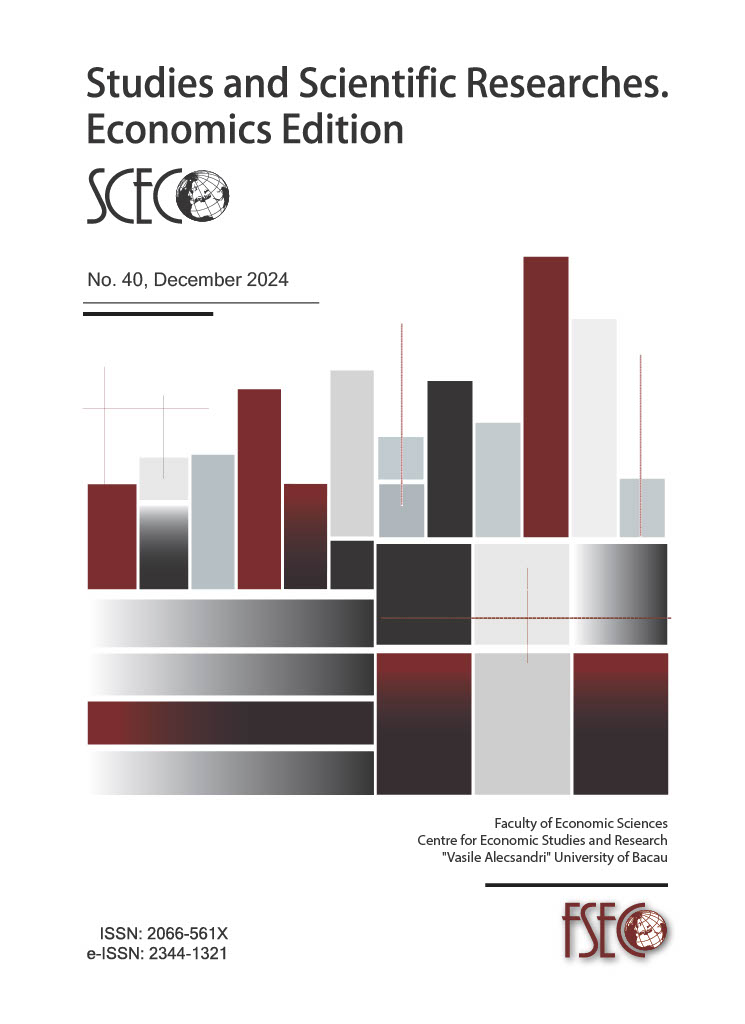E-Invoicing System In The Accounting Professionals' View - An Empirical Research
DOI:
https://doi.org/10.29358/sceco.v0i40.600Keywords:
e-invoicing system, digitalization, perception of accounting professionals, tax fraud, operational efficiencyAbstract
The digital transformation of the relationship between the private sector and the tax administration, through the implementation of the electronic invoicing system (RO e-Factura) represents a huge leap in the reform of public administration in Romania, with the potential to improve efficiency, reduce costs and simplify invoicing processes. In this context, the purpose of this study is to survey respondents' opinion on the implementation and application of RO e-Factura on operational efficiency, costs, tax compliance and environmental sustainability, highlighting the benefits for both companies and the business environment, ahead of the mandatory implementation, as of July 1, 2024. Thus, through the questionnaire, we aimed to obtain information on the level of familiarization with the e-invoicing concept, perceived benefits, obstacles encountered in the implementation of this system, as well as the level of readiness and interest in adopting e-invoices. The results obtained can provide useful guidance and information for the state and regulatory bodies that can use them in order to optimize the use of e-invoices in the public and private sector in Romania.
Downloads
References
Asender, R., & Sapkota, G. (2024). The role of e-invoicing in enhancing business efficiency and promoting sustainability in Finland: exploring benefits, efficiency, and environmental impact. Bachelor of Business Information Technology. https://www.theseus.fi/bitstream/handle/10024/874204/Asender_Sapkota.pdf?sequence=2.
Bahramov, F. (2024). The Possible Outcomes of E-Invoicing on Tax Collection and Impact on Future of Romanian Tax System. Journal of Financial Studies, 16(9), 23-37. https://revista.isfin.ro/wp-content/uploads/2024/05/2.-Bahramov-Faud.pdf.
Chen, H., Wang, Y., & Xue, W. (2024). Information accuracy verification system of invoice metadata based on data warehouse. International Journal of Business Intelligence and Data Mining, 25(1), 34-51. https://doi.org/10.1504/IJBIDM.2024.139451.
Cuylen, A., Kosch, L., & Breitner, M. H. (2016). Development of a maturity model for electronic invoice processes. Electronic markets, 26(2), 115-127. https://doi.org/10.1007/s12525-015-0206-x.
European Commission. (2010). Communication from the commission to the european parliament, the council, the european economic and social committee and the committee of the regions. Reaping the benefits of electronic invoicing for Europe. Brussels, https://eur-lex.europa.eu/LexUriServ/LexUriServ.do?uri=COM:2010:0712:FIN:en:PDF.
European Commission. (2024). Report From The Commission To The European Parliament And The Council on the effects of Directive 2014/55/EU on the Internal Market and on the uptake of electronic invoicing in public procurement. Brussels, https://eur-lex.europa.eu/legal-content/EN/TXT/PDF/?uri=CELEX:52024DC0072.
Hoblos, N., Joukhadar, G., Rabhi, L., Rabhi, F., & Hussain, W. (2024). Addressing e-Invoicing Adoption Challenges using API Ecosystems. Australasian Conference on Information Systems 2024, Canberra. https://aisel.aisnet.org/acis2024/102/.
Isip, A. (2024). How is the Adoption of E-invoicing System Affecting the Outsourcing of Accounting Services?. In Proceedings of the... international conference on economics and social sciences. (Vol. 6, No. 1, pp. 142-155). EDITURA ASE. https://www.ceeol.com/search/article-detail?id=1269736.
Nguyen, A. H., Nguyen, T. P., & Dang, G. T. T. (2020). Determinants of E-invoice adoption: Empirical evidence from Vietnam. The Journal of Asian Finance, Economics and Business, 7(7), 311-321. https://www.kci.go.kr/kciportal/landing/article.kci?arti_id=ART002607919.
GEO 138/2024. Ordonanță De Urgență nr. 138 din 4 decembrie 2024 privind modificarea și completarea unor acte normative în domeniul fiscal-bugetar, precum și pentru reglementarea altor măsuri. https://legislatie.just.ro/Public/DetaliiDocument/292029.
Ozor, C. C., Okafor, C. R., & Ohia, P. N. (2024). Exploring the Role of Blockchain in Promoting Transparency in E-Invoicing Systems Among Multinational Corporations in Nigeria. In Indonesian Annual Conference Series 131-139. https://www.researchgate.net/publication/382497460_Exploring_the_Role_of_Blockchain_in_Promoting_Transparency_in_E-Invoicing_Systems_Among_Multinational_Corporations_in_Nigeria.
Pham, T. M. L., Le, T. T., Truong, T. H. L., & Tran, M. D. (2020). Determinants influencing tax compliance: The case of Vietnam. The Journal of Asian Finance, Economics and Business, 7(2), 65-73. http://dx.doi.org/10.13106/jafeb.2020.vol7.no2.65.
Pucihar, A., & Lenart, G. (2024). E-invoicing: A Catalyst for Digitalization and Sustainability. Organizacija, 57(1), 3-19. https://doi.org/10.2478/orga-2024-0001.
Puşu, A. (2024). Navigating the digital frontier: exploring the impact and evolution of electronic billing and invoice systems in modern accounting practices. ISSC 2024, Prospects Of Accounting Development: The Young Researcher’s View. https://doi.org/10.53486/issc2024.39.
San, A. N. C., Seng, W. T., Yee, C. J., Siong, O. H., Hussain, N. C., & Khen, T. M. (2023, December). Preparing SMEs for E-Invoice Adoption: Assessing Technology Readiness and Its Segmentation. In 11th International Conference on Business, Accounting, Finance and Economics (BAFE 2023), 303-315. Atlantis Press. https://doi.org/10.2991/978-94-6463-342-9_22.
Sudhakar, S., Michael, T., & Sangeetha, P. (2024). The Road to E-Invoicing: Understanding Technology Readiness in Indian Industry. Library Progress International, 44(2s), 2258-2268. https://doi.org/10.48165/bapas.2024.44.2.1.
Telukdarie, A., Dube, T., Munsamy, M., Murulane, K., & Mongwe, R. (2024). Navigating digital challenges for SMEs: a two-tier approach to risks mitigation and sustainability. Sustainability, 16(14), 5857. https://doi.org/10.3390/su16145857.
Yang, C., Yang, L., Song, Y., & Fu, X. (2023). Paper Invoice Dilemma and Electronic Invoice Solution. Frontiers in Business, Economics and Management, 12(1), 12-21. http://dx.doi.org/10.54097/fbem.v12i1.13620.
Downloads
Published
Issue
Section
License
Copyright (c) 2024 Marian Socoliuc

This work is licensed under a Creative Commons Attribution 4.0 International License.
Authors who publish with Studies and Scientific Researches. Economics Edition (SCECO) agree to the following terms:
-
Copyright Retention
Authors retain full copyright over their work and grant the journal the right of first publication. The published article is simultaneously licensed under the Creative Commons Attribution 4.0 International License (CC BY 4.0). This license permits others to:-
Share — copy and redistribute the material in any medium or format
-
Adapt — remix, transform, and build upon the material
for any purpose, even commercially, as long as proper attribution is given to the original author(s) and source.
-
-
Additional Distribution
Authors may enter into separate, non-exclusive contractual arrangements for the distribution of the journal’s published version of the work (e.g., post it to an institutional repository, include it in a book), with clear credit to the initial publication in SCECO. -
Preprint and Open Posting Policy
Authors are encouraged to post their work online (e.g., in preprint archives, institutional repositories, or personal websites) before submission, during review, and after publication.
This practice supports academic exchange and can lead to earlier and broader dissemination and citation of published work.
(See: “The Effect of Open Access” – PLOS)
For further inquiries regarding copyright, licensing, or archiving, please contact the editorial office at Editorial Board








